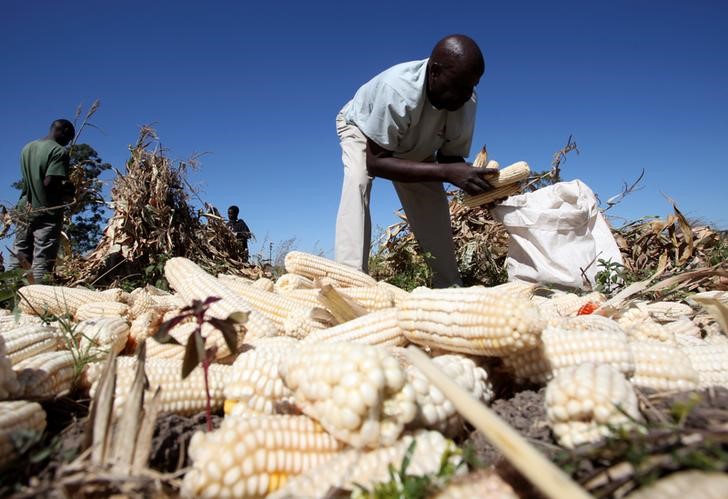By Marko Phiri
BULAWAYO, Zimbabwe (Thomson Reuters Foundation) - In the battle for food security, Fanuel Dube is resisting his government – and giving in to his children.
As Zimbabwe’s sowing season nears, the small-scale farmer from Filabusi, a village about 100km (63 miles) south of Bulawayo, intends to continue planting maize.
He has refused the entreaties of government agriculture officers to grow smaller, naturally drought-resistant grains such as sorghum and millet. The problem, he says, is that “our children do not like it”.
“We ate sorghum when we were younger ourselves, but we have been planting maize for so long now it’s the only food our children know,” Dube explained.
Dube is not the only farmer reluctant to abandon southern Africa's staple grain, even as harvests of it plummet.
Maize production dropped by 40 percent in Zimbabwe in 2015–16 due to poor rains, according to the Commercial Farmers Union. The government has pushed farmers to begin growing small grains as the future of the country’s food security in a time of persistent drought.
But small-scale farmers have been slow in making the change, and last year the agriculture ministry reported a shortage of even the seeds to grow small grains, because farmers are not planting enough to generate new stocks.
NO TASTE FOR CHANGE
According to research by Chipo Zishiri, a small-grains specialist at the Ministry of Agriculture, Mechanisation and Irrigation Development, Zimbabwe has witnessed a decline in the production of small grains over the past 14 years because farmers are unwilling to grow sorghum, millet and other varieties.
“Tastes and preferences are a contributory factor that is derailing the production of small grain,” said Zishiri.
But in a time of climate variability and increased frequency of drought, “improving productivity of small grains is the key to food and nutrition security,” she said.
Tapuwa Gomo, a development expert at the United Nations Office for the Coordination of Humanitarian Affairs, said the refusal by farmers to switch crops “demonstrates lack of research and community consultation” by the government.
According to the agriculture ministry, up to 80 percent of the country’s maize production comes from small-scale farmers, and poor harvests this year resulted in the country having to import 700,000 tonnes of maize to avert hunger.
The country’s primary maize seed manufacturer, Seed Co, has invested in new drought-resistant varieties. But Stephen Chengetai, an agriculture extension officer at the agriculture ministry, told Thomson Reuters Foundation that one problem in seeing them distributed is that they often “are very expensive”.
“They are expensive not just for farmers themselves but more worryingly for government which distributes farming inputs for free,” Chengetai said.
A 25kg bag of more traditional maize seed that takes four months to mature costs around $80 while a variety that is ready for harvest in two months costs $120 at retail outlets.
Finance Minister Patrick Chinamasa has lamented the government’s lack of capacity to provide enough money to help farmers, and banks have also been unwilling to make loans to farmers who do not have clear title to their land, experts say.
Gift Mugano, a research associate in the department of economics and economic history at Nelson Mandela Metropolitan University in South Africa, said Zimbabwe needs to restructure its seeds services unit at the agriculture ministry and improve regulation of seeds if the country is to restore food security.
